The Application of Transtheoretical Model of Change in Patient Care
VerifiedAdded on 2022/11/07
|9
|2356
|167
Essay
AI Summary
This essay examines the Transtheoretical Model of Change (TTM) and its application in healthcare, using a case study of a 58-year-old patient, Harry, who is overweight and undergoing hip replacement surgery. The essay focuses on motivating Harry to change his health behaviors, particularly his diet, using motivational interviewing techniques within the TTM framework. It details the six stages of the TTM: precontemplation, contemplation, preparation, action, maintenance, and termination, and explains how nurses can guide patients through these stages. The essay highlights the importance of acknowledging the patient's perspective, setting goals, and providing education to promote long-term behavior change and prevent relapse. The role of motivational interviewing is emphasized as a key strategy to encourage patients to adopt healthier lifestyles and improve their health outcomes. The essay references several studies to support the use of TTM and motivational interviewing in healthcare.
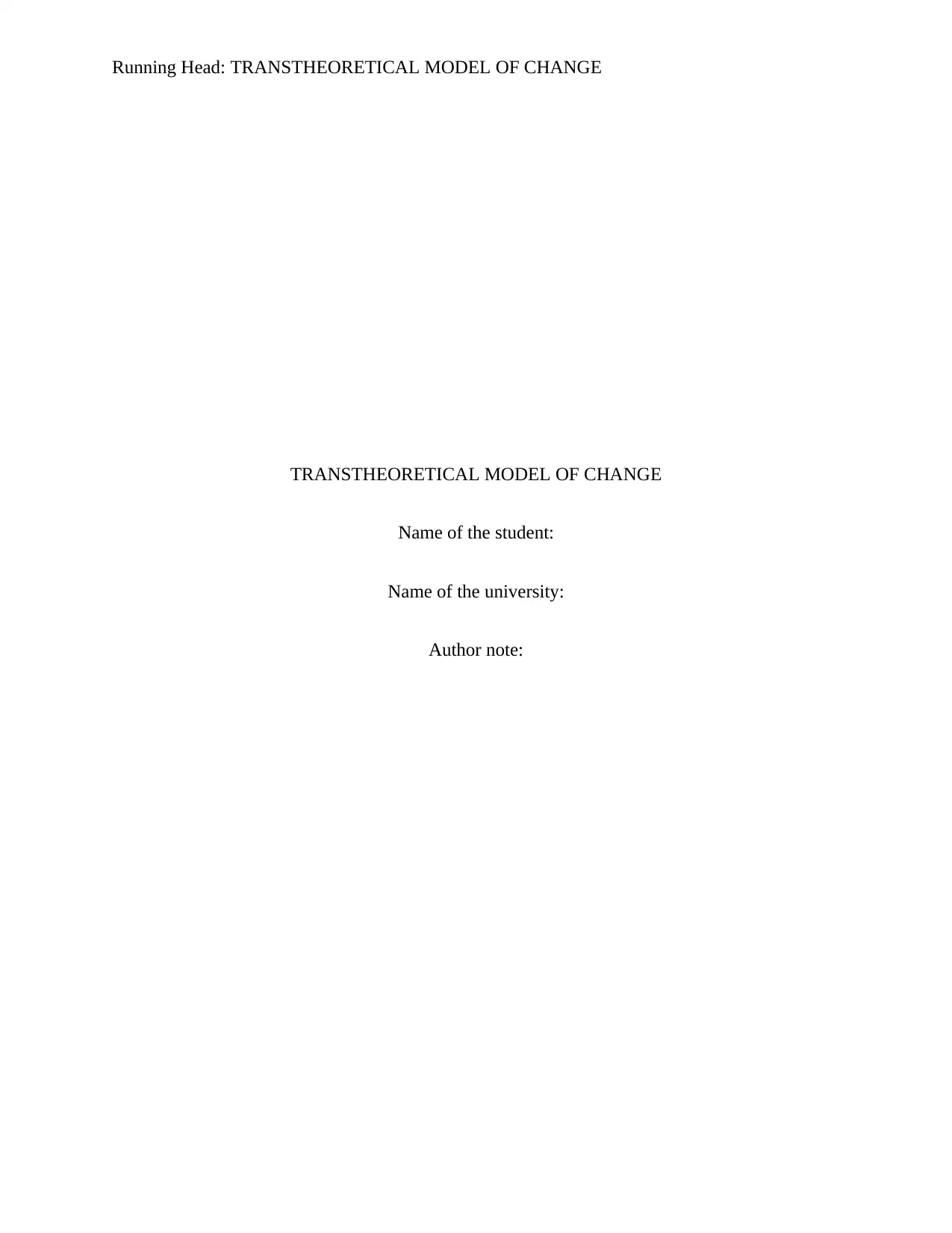
Running Head: TRANSTHEORETICAL MODEL OF CHANGE
TRANSTHEORETICAL MODEL OF CHANGE
Name of the student:
Name of the university:
Author note:
TRANSTHEORETICAL MODEL OF CHANGE
Name of the student:
Name of the university:
Author note:
Paraphrase This Document
Need a fresh take? Get an instant paraphrase of this document with our AI Paraphraser
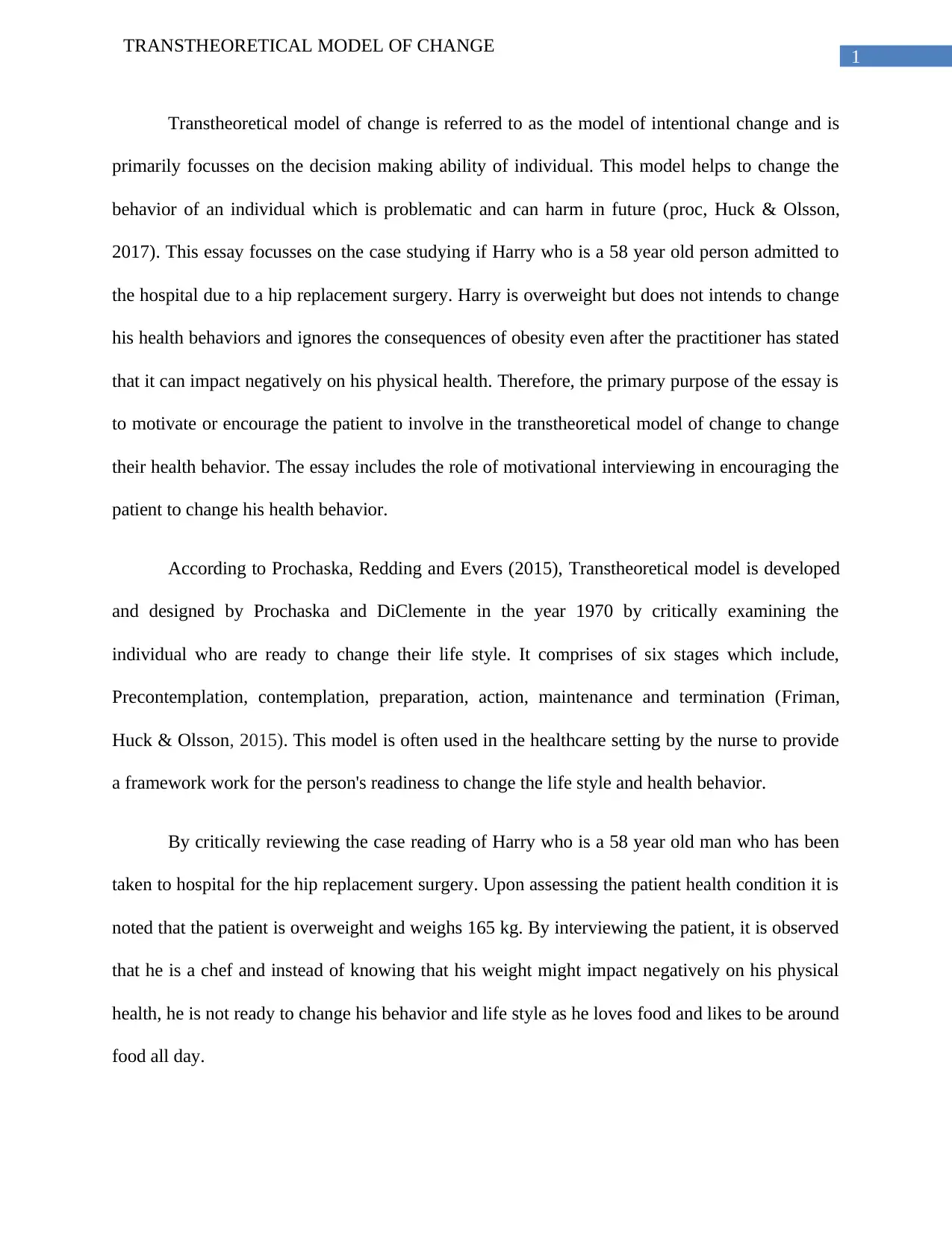
1
TRANSTHEORETICAL MODEL OF CHANGE
Transtheoretical model of change is referred to as the model of intentional change and is
primarily focusses on the decision making ability of individual. This model helps to change the
behavior of an individual which is problematic and can harm in future (proc, Huck & Olsson,
2017). This essay focusses on the case studying if Harry who is a 58 year old person admitted to
the hospital due to a hip replacement surgery. Harry is overweight but does not intends to change
his health behaviors and ignores the consequences of obesity even after the practitioner has stated
that it can impact negatively on his physical health. Therefore, the primary purpose of the essay is
to motivate or encourage the patient to involve in the transtheoretical model of change to change
their health behavior. The essay includes the role of motivational interviewing in encouraging the
patient to change his health behavior.
According to Prochaska, Redding and Evers (2015), Transtheoretical model is developed
and designed by Prochaska and DiClemente in the year 1970 by critically examining the
individual who are ready to change their life style. It comprises of six stages which include,
Precontemplation, contemplation, preparation, action, maintenance and termination (Friman,
Huck & Olsson, 2015). This model is often used in the healthcare setting by the nurse to provide
a framework work for the person's readiness to change the life style and health behavior.
By critically reviewing the case reading of Harry who is a 58 year old man who has been
taken to hospital for the hip replacement surgery. Upon assessing the patient health condition it is
noted that the patient is overweight and weighs 165 kg. By interviewing the patient, it is observed
that he is a chef and instead of knowing that his weight might impact negatively on his physical
health, he is not ready to change his behavior and life style as he loves food and likes to be around
food all day.
TRANSTHEORETICAL MODEL OF CHANGE
Transtheoretical model of change is referred to as the model of intentional change and is
primarily focusses on the decision making ability of individual. This model helps to change the
behavior of an individual which is problematic and can harm in future (proc, Huck & Olsson,
2017). This essay focusses on the case studying if Harry who is a 58 year old person admitted to
the hospital due to a hip replacement surgery. Harry is overweight but does not intends to change
his health behaviors and ignores the consequences of obesity even after the practitioner has stated
that it can impact negatively on his physical health. Therefore, the primary purpose of the essay is
to motivate or encourage the patient to involve in the transtheoretical model of change to change
their health behavior. The essay includes the role of motivational interviewing in encouraging the
patient to change his health behavior.
According to Prochaska, Redding and Evers (2015), Transtheoretical model is developed
and designed by Prochaska and DiClemente in the year 1970 by critically examining the
individual who are ready to change their life style. It comprises of six stages which include,
Precontemplation, contemplation, preparation, action, maintenance and termination (Friman,
Huck & Olsson, 2015). This model is often used in the healthcare setting by the nurse to provide
a framework work for the person's readiness to change the life style and health behavior.
By critically reviewing the case reading of Harry who is a 58 year old man who has been
taken to hospital for the hip replacement surgery. Upon assessing the patient health condition it is
noted that the patient is overweight and weighs 165 kg. By interviewing the patient, it is observed
that he is a chef and instead of knowing that his weight might impact negatively on his physical
health, he is not ready to change his behavior and life style as he loves food and likes to be around
food all day.
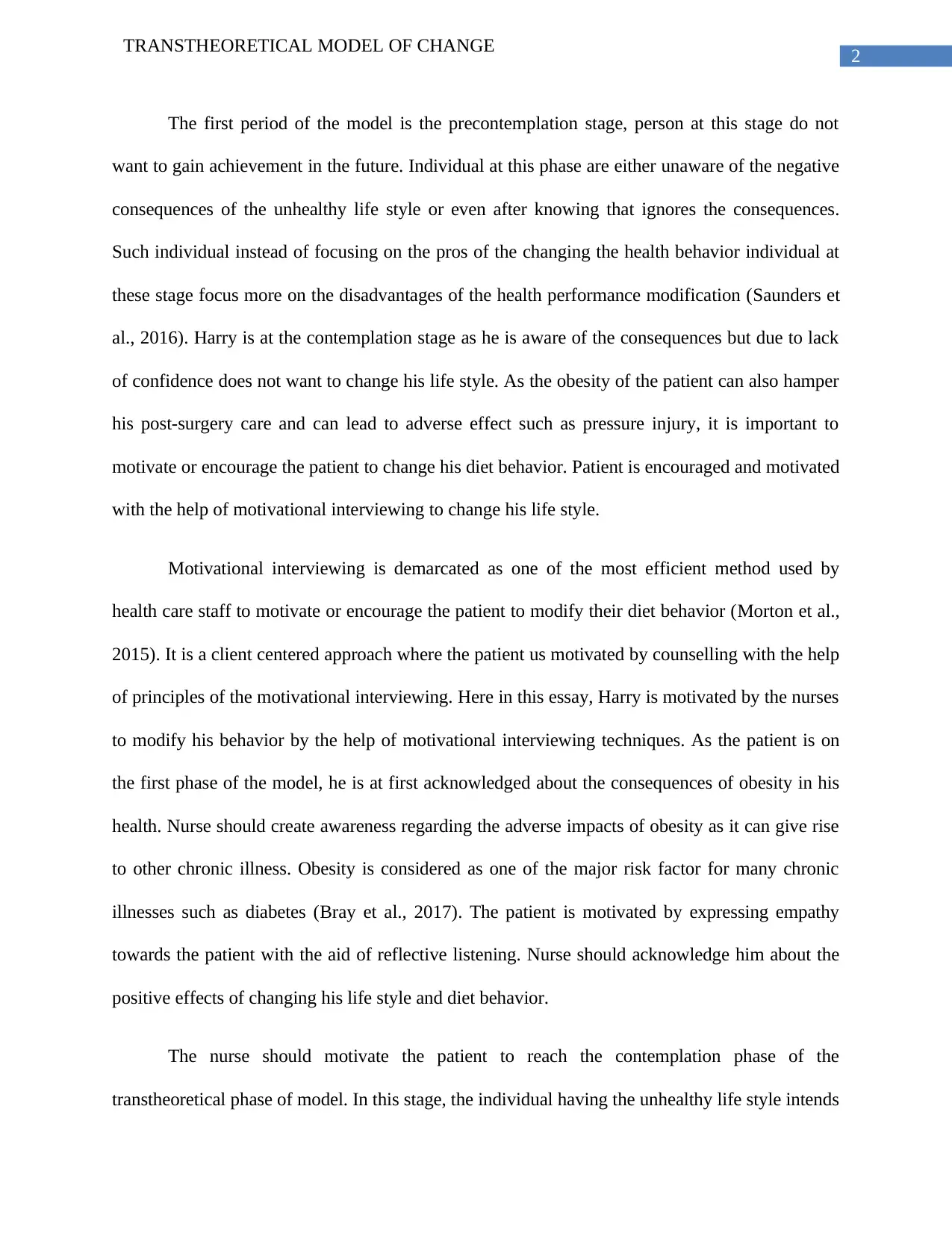
2
TRANSTHEORETICAL MODEL OF CHANGE
The first period of the model is the precontemplation stage, person at this stage do not
want to gain achievement in the future. Individual at this phase are either unaware of the negative
consequences of the unhealthy life style or even after knowing that ignores the consequences.
Such individual instead of focusing on the pros of the changing the health behavior individual at
these stage focus more on the disadvantages of the health performance modification (Saunders et
al., 2016). Harry is at the contemplation stage as he is aware of the consequences but due to lack
of confidence does not want to change his life style. As the obesity of the patient can also hamper
his post-surgery care and can lead to adverse effect such as pressure injury, it is important to
motivate or encourage the patient to change his diet behavior. Patient is encouraged and motivated
with the help of motivational interviewing to change his life style.
Motivational interviewing is demarcated as one of the most efficient method used by
health care staff to motivate or encourage the patient to modify their diet behavior (Morton et al.,
2015). It is a client centered approach where the patient us motivated by counselling with the help
of principles of the motivational interviewing. Here in this essay, Harry is motivated by the nurses
to modify his behavior by the help of motivational interviewing techniques. As the patient is on
the first phase of the model, he is at first acknowledged about the consequences of obesity in his
health. Nurse should create awareness regarding the adverse impacts of obesity as it can give rise
to other chronic illness. Obesity is considered as one of the major risk factor for many chronic
illnesses such as diabetes (Bray et al., 2017). The patient is motivated by expressing empathy
towards the patient with the aid of reflective listening. Nurse should acknowledge him about the
positive effects of changing his life style and diet behavior.
The nurse should motivate the patient to reach the contemplation phase of the
transtheoretical phase of model. In this stage, the individual having the unhealthy life style intends
TRANSTHEORETICAL MODEL OF CHANGE
The first period of the model is the precontemplation stage, person at this stage do not
want to gain achievement in the future. Individual at this phase are either unaware of the negative
consequences of the unhealthy life style or even after knowing that ignores the consequences.
Such individual instead of focusing on the pros of the changing the health behavior individual at
these stage focus more on the disadvantages of the health performance modification (Saunders et
al., 2016). Harry is at the contemplation stage as he is aware of the consequences but due to lack
of confidence does not want to change his life style. As the obesity of the patient can also hamper
his post-surgery care and can lead to adverse effect such as pressure injury, it is important to
motivate or encourage the patient to change his diet behavior. Patient is encouraged and motivated
with the help of motivational interviewing to change his life style.
Motivational interviewing is demarcated as one of the most efficient method used by
health care staff to motivate or encourage the patient to modify their diet behavior (Morton et al.,
2015). It is a client centered approach where the patient us motivated by counselling with the help
of principles of the motivational interviewing. Here in this essay, Harry is motivated by the nurses
to modify his behavior by the help of motivational interviewing techniques. As the patient is on
the first phase of the model, he is at first acknowledged about the consequences of obesity in his
health. Nurse should create awareness regarding the adverse impacts of obesity as it can give rise
to other chronic illness. Obesity is considered as one of the major risk factor for many chronic
illnesses such as diabetes (Bray et al., 2017). The patient is motivated by expressing empathy
towards the patient with the aid of reflective listening. Nurse should acknowledge him about the
positive effects of changing his life style and diet behavior.
The nurse should motivate the patient to reach the contemplation phase of the
transtheoretical phase of model. In this stage, the individual having the unhealthy life style intends
⊘ This is a preview!⊘
Do you want full access?
Subscribe today to unlock all pages.

Trusted by 1+ million students worldwide
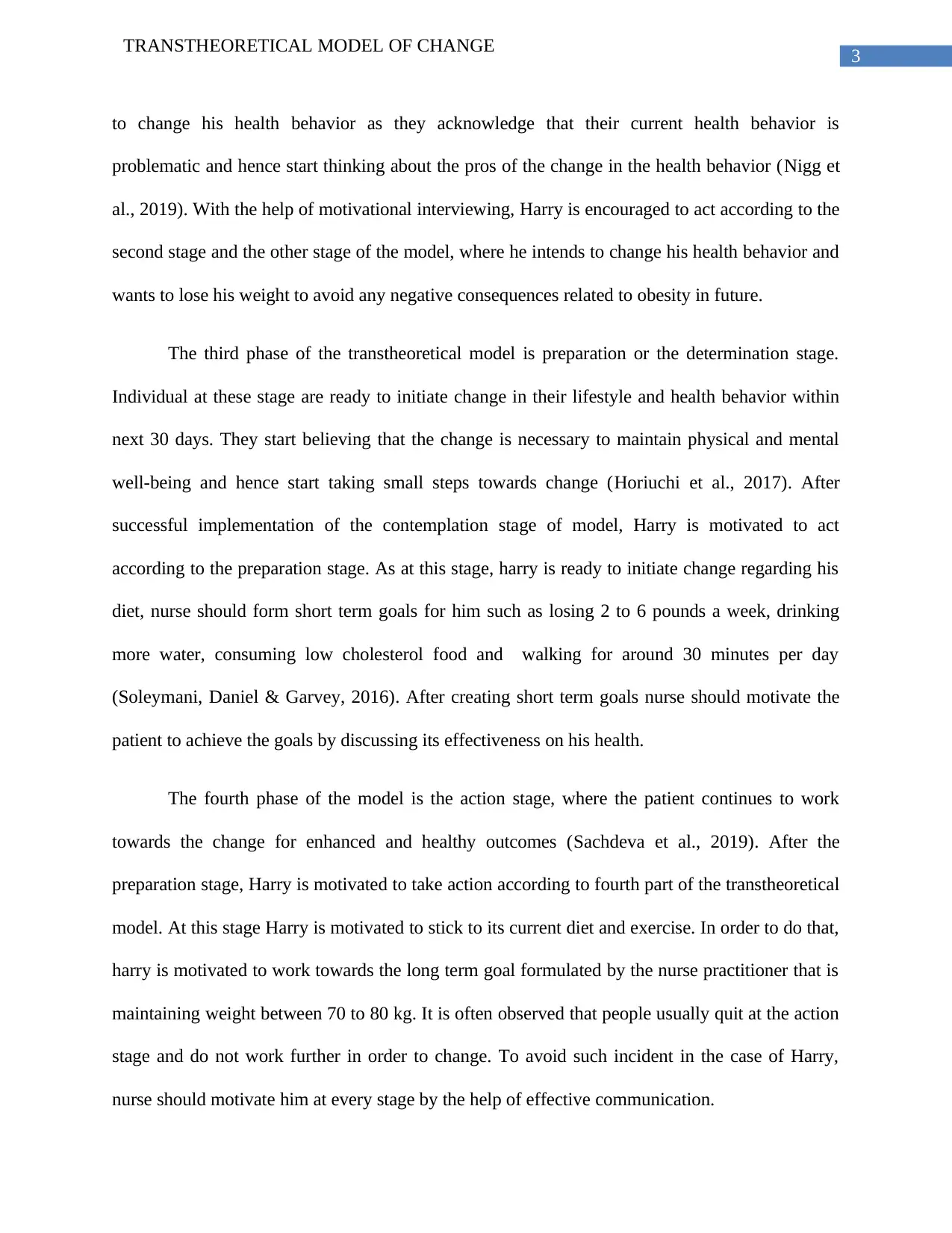
3
TRANSTHEORETICAL MODEL OF CHANGE
to change his health behavior as they acknowledge that their current health behavior is
problematic and hence start thinking about the pros of the change in the health behavior (Nigg et
al., 2019). With the help of motivational interviewing, Harry is encouraged to act according to the
second stage and the other stage of the model, where he intends to change his health behavior and
wants to lose his weight to avoid any negative consequences related to obesity in future.
The third phase of the transtheoretical model is preparation or the determination stage.
Individual at these stage are ready to initiate change in their lifestyle and health behavior within
next 30 days. They start believing that the change is necessary to maintain physical and mental
well-being and hence start taking small steps towards change (Horiuchi et al., 2017). After
successful implementation of the contemplation stage of model, Harry is motivated to act
according to the preparation stage. As at this stage, harry is ready to initiate change regarding his
diet, nurse should form short term goals for him such as losing 2 to 6 pounds a week, drinking
more water, consuming low cholesterol food and walking for around 30 minutes per day
(Soleymani, Daniel & Garvey, 2016). After creating short term goals nurse should motivate the
patient to achieve the goals by discussing its effectiveness on his health.
The fourth phase of the model is the action stage, where the patient continues to work
towards the change for enhanced and healthy outcomes (Sachdeva et al., 2019). After the
preparation stage, Harry is motivated to take action according to fourth part of the transtheoretical
model. At this stage Harry is motivated to stick to its current diet and exercise. In order to do that,
harry is motivated to work towards the long term goal formulated by the nurse practitioner that is
maintaining weight between 70 to 80 kg. It is often observed that people usually quit at the action
stage and do not work further in order to change. To avoid such incident in the case of Harry,
nurse should motivate him at every stage by the help of effective communication.
TRANSTHEORETICAL MODEL OF CHANGE
to change his health behavior as they acknowledge that their current health behavior is
problematic and hence start thinking about the pros of the change in the health behavior (Nigg et
al., 2019). With the help of motivational interviewing, Harry is encouraged to act according to the
second stage and the other stage of the model, where he intends to change his health behavior and
wants to lose his weight to avoid any negative consequences related to obesity in future.
The third phase of the transtheoretical model is preparation or the determination stage.
Individual at these stage are ready to initiate change in their lifestyle and health behavior within
next 30 days. They start believing that the change is necessary to maintain physical and mental
well-being and hence start taking small steps towards change (Horiuchi et al., 2017). After
successful implementation of the contemplation stage of model, Harry is motivated to act
according to the preparation stage. As at this stage, harry is ready to initiate change regarding his
diet, nurse should form short term goals for him such as losing 2 to 6 pounds a week, drinking
more water, consuming low cholesterol food and walking for around 30 minutes per day
(Soleymani, Daniel & Garvey, 2016). After creating short term goals nurse should motivate the
patient to achieve the goals by discussing its effectiveness on his health.
The fourth phase of the model is the action stage, where the patient continues to work
towards the change for enhanced and healthy outcomes (Sachdeva et al., 2019). After the
preparation stage, Harry is motivated to take action according to fourth part of the transtheoretical
model. At this stage Harry is motivated to stick to its current diet and exercise. In order to do that,
harry is motivated to work towards the long term goal formulated by the nurse practitioner that is
maintaining weight between 70 to 80 kg. It is often observed that people usually quit at the action
stage and do not work further in order to change. To avoid such incident in the case of Harry,
nurse should motivate him at every stage by the help of effective communication.
Paraphrase This Document
Need a fresh take? Get an instant paraphrase of this document with our AI Paraphraser
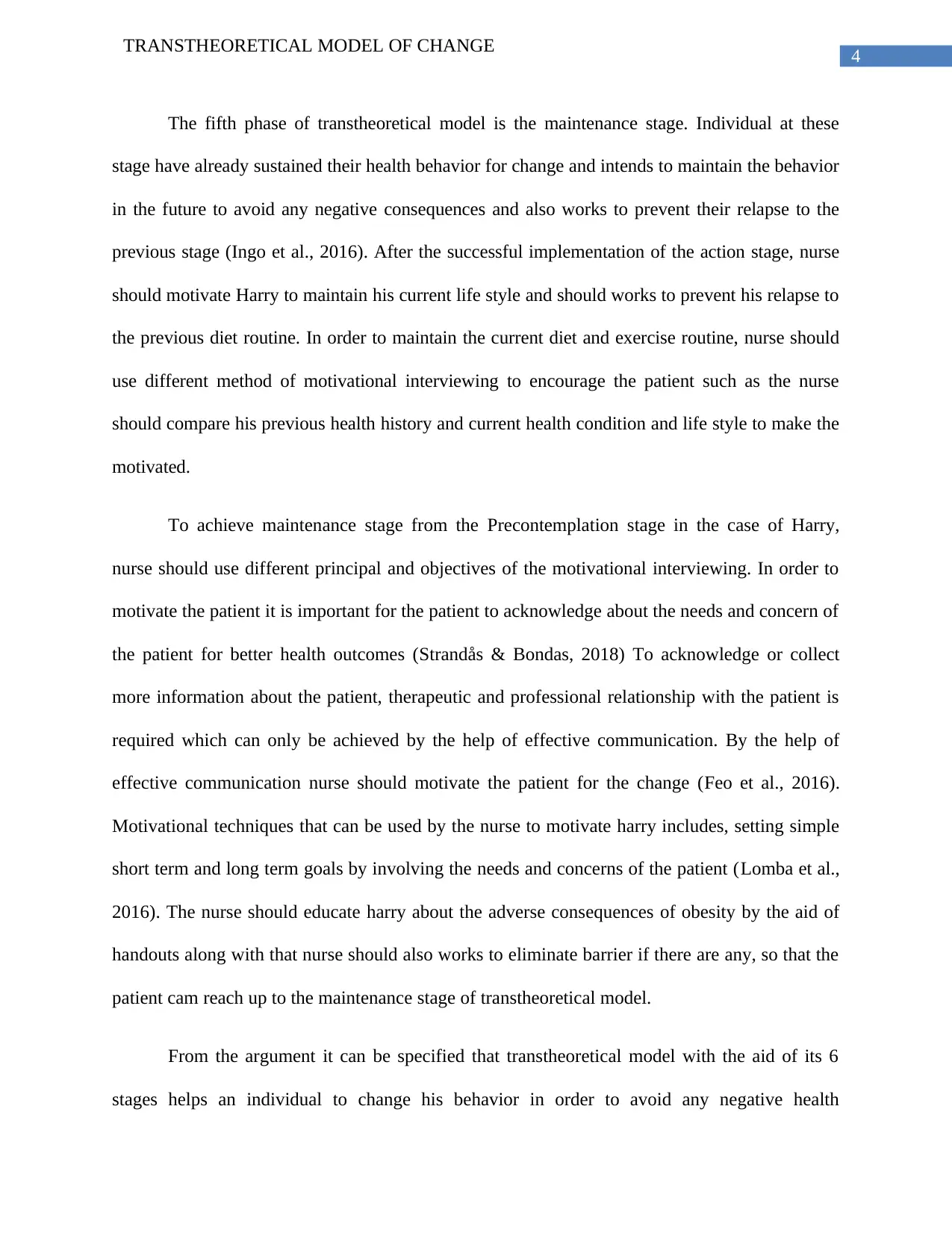
4
TRANSTHEORETICAL MODEL OF CHANGE
The fifth phase of transtheoretical model is the maintenance stage. Individual at these
stage have already sustained their health behavior for change and intends to maintain the behavior
in the future to avoid any negative consequences and also works to prevent their relapse to the
previous stage (Ingo et al., 2016). After the successful implementation of the action stage, nurse
should motivate Harry to maintain his current life style and should works to prevent his relapse to
the previous diet routine. In order to maintain the current diet and exercise routine, nurse should
use different method of motivational interviewing to encourage the patient such as the nurse
should compare his previous health history and current health condition and life style to make the
motivated.
To achieve maintenance stage from the Precontemplation stage in the case of Harry,
nurse should use different principal and objectives of the motivational interviewing. In order to
motivate the patient it is important for the patient to acknowledge about the needs and concern of
the patient for better health outcomes (Strandås & Bondas, 2018) To acknowledge or collect
more information about the patient, therapeutic and professional relationship with the patient is
required which can only be achieved by the help of effective communication. By the help of
effective communication nurse should motivate the patient for the change (Feo et al., 2016).
Motivational techniques that can be used by the nurse to motivate harry includes, setting simple
short term and long term goals by involving the needs and concerns of the patient (Lomba et al.,
2016). The nurse should educate harry about the adverse consequences of obesity by the aid of
handouts along with that nurse should also works to eliminate barrier if there are any, so that the
patient cam reach up to the maintenance stage of transtheoretical model.
From the argument it can be specified that transtheoretical model with the aid of its 6
stages helps an individual to change his behavior in order to avoid any negative health
TRANSTHEORETICAL MODEL OF CHANGE
The fifth phase of transtheoretical model is the maintenance stage. Individual at these
stage have already sustained their health behavior for change and intends to maintain the behavior
in the future to avoid any negative consequences and also works to prevent their relapse to the
previous stage (Ingo et al., 2016). After the successful implementation of the action stage, nurse
should motivate Harry to maintain his current life style and should works to prevent his relapse to
the previous diet routine. In order to maintain the current diet and exercise routine, nurse should
use different method of motivational interviewing to encourage the patient such as the nurse
should compare his previous health history and current health condition and life style to make the
motivated.
To achieve maintenance stage from the Precontemplation stage in the case of Harry,
nurse should use different principal and objectives of the motivational interviewing. In order to
motivate the patient it is important for the patient to acknowledge about the needs and concern of
the patient for better health outcomes (Strandås & Bondas, 2018) To acknowledge or collect
more information about the patient, therapeutic and professional relationship with the patient is
required which can only be achieved by the help of effective communication. By the help of
effective communication nurse should motivate the patient for the change (Feo et al., 2016).
Motivational techniques that can be used by the nurse to motivate harry includes, setting simple
short term and long term goals by involving the needs and concerns of the patient (Lomba et al.,
2016). The nurse should educate harry about the adverse consequences of obesity by the aid of
handouts along with that nurse should also works to eliminate barrier if there are any, so that the
patient cam reach up to the maintenance stage of transtheoretical model.
From the argument it can be specified that transtheoretical model with the aid of its 6
stages helps an individual to change his behavior in order to avoid any negative health
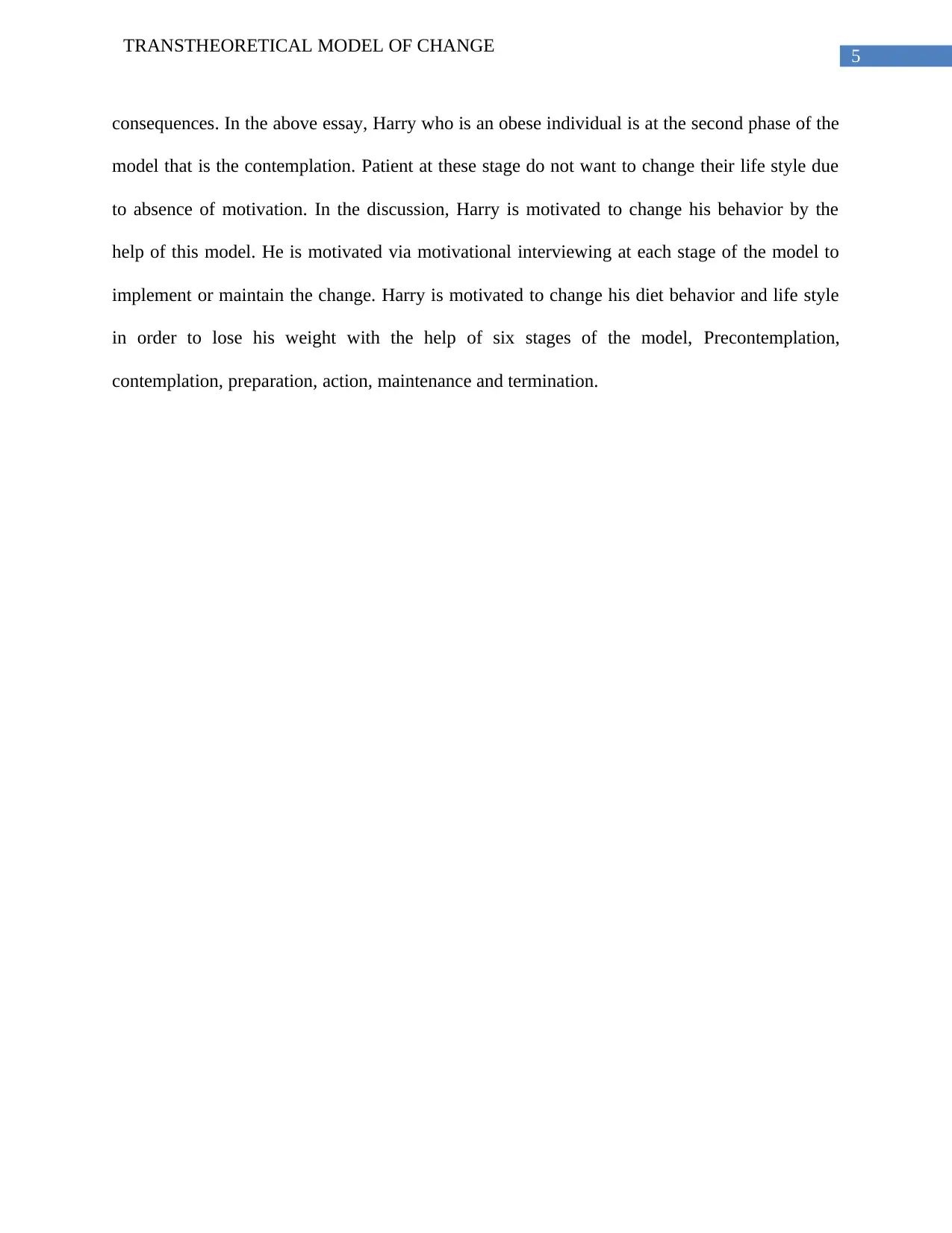
5
TRANSTHEORETICAL MODEL OF CHANGE
consequences. In the above essay, Harry who is an obese individual is at the second phase of the
model that is the contemplation. Patient at these stage do not want to change their life style due
to absence of motivation. In the discussion, Harry is motivated to change his behavior by the
help of this model. He is motivated via motivational interviewing at each stage of the model to
implement or maintain the change. Harry is motivated to change his diet behavior and life style
in order to lose his weight with the help of six stages of the model, Precontemplation,
contemplation, preparation, action, maintenance and termination.
TRANSTHEORETICAL MODEL OF CHANGE
consequences. In the above essay, Harry who is an obese individual is at the second phase of the
model that is the contemplation. Patient at these stage do not want to change their life style due
to absence of motivation. In the discussion, Harry is motivated to change his behavior by the
help of this model. He is motivated via motivational interviewing at each stage of the model to
implement or maintain the change. Harry is motivated to change his diet behavior and life style
in order to lose his weight with the help of six stages of the model, Precontemplation,
contemplation, preparation, action, maintenance and termination.
⊘ This is a preview!⊘
Do you want full access?
Subscribe today to unlock all pages.

Trusted by 1+ million students worldwide
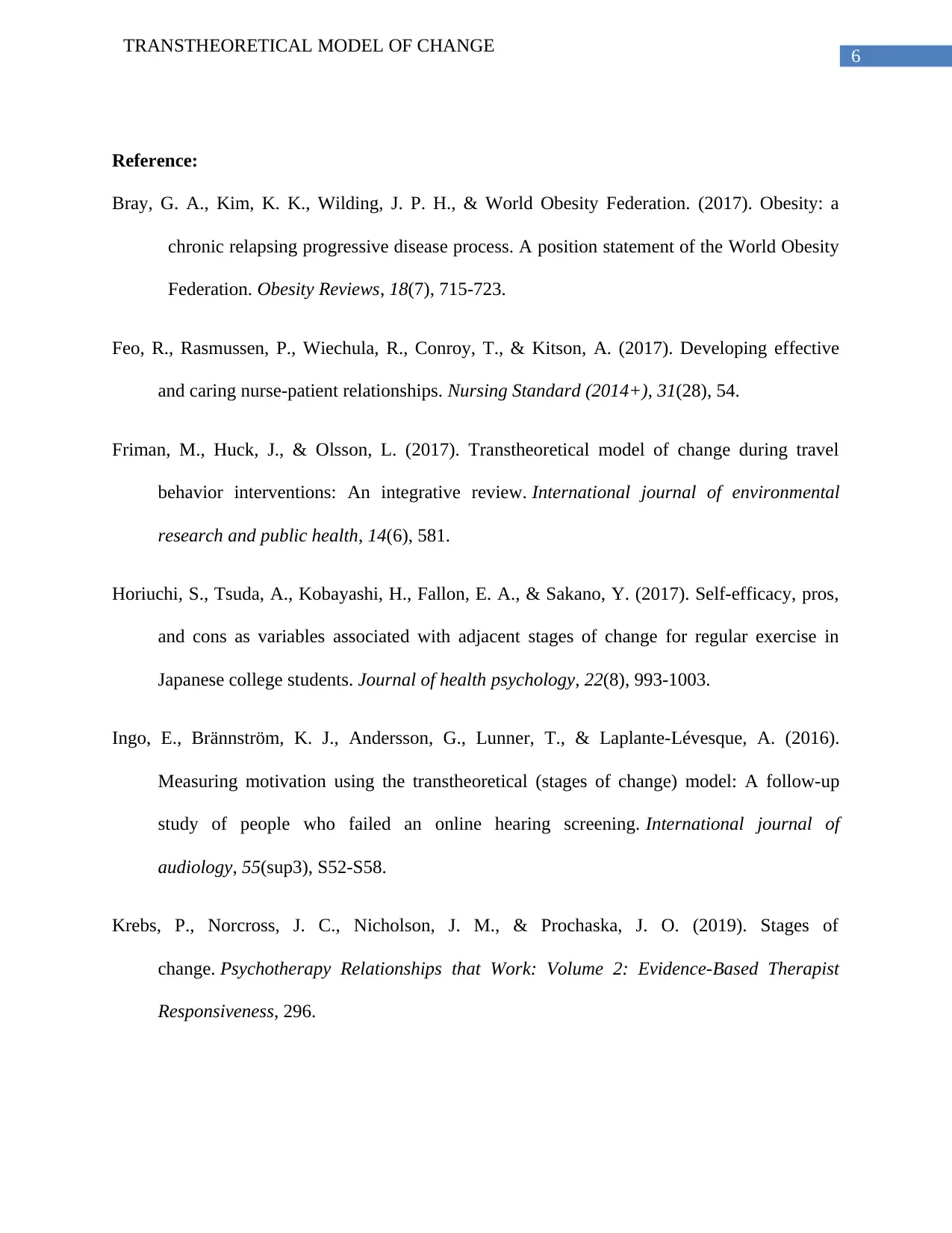
6
TRANSTHEORETICAL MODEL OF CHANGE
Reference:
Bray, G. A., Kim, K. K., Wilding, J. P. H., & World Obesity Federation. (2017). Obesity: a
chronic relapsing progressive disease process. A position statement of the World Obesity
Federation. Obesity Reviews, 18(7), 715-723.
Feo, R., Rasmussen, P., Wiechula, R., Conroy, T., & Kitson, A. (2017). Developing effective
and caring nurse-patient relationships. Nursing Standard (2014+), 31(28), 54.
Friman, M., Huck, J., & Olsson, L. (2017). Transtheoretical model of change during travel
behavior interventions: An integrative review. International journal of environmental
research and public health, 14(6), 581.
Horiuchi, S., Tsuda, A., Kobayashi, H., Fallon, E. A., & Sakano, Y. (2017). Self-efficacy, pros,
and cons as variables associated with adjacent stages of change for regular exercise in
Japanese college students. Journal of health psychology, 22(8), 993-1003.
Ingo, E., Brännström, K. J., Andersson, G., Lunner, T., & Laplante-Lévesque, A. (2016).
Measuring motivation using the transtheoretical (stages of change) model: A follow-up
study of people who failed an online hearing screening. International journal of
audiology, 55(sup3), S52-S58.
Krebs, P., Norcross, J. C., Nicholson, J. M., & Prochaska, J. O. (2019). Stages of
change. Psychotherapy Relationships that Work: Volume 2: Evidence-Based Therapist
Responsiveness, 296.
TRANSTHEORETICAL MODEL OF CHANGE
Reference:
Bray, G. A., Kim, K. K., Wilding, J. P. H., & World Obesity Federation. (2017). Obesity: a
chronic relapsing progressive disease process. A position statement of the World Obesity
Federation. Obesity Reviews, 18(7), 715-723.
Feo, R., Rasmussen, P., Wiechula, R., Conroy, T., & Kitson, A. (2017). Developing effective
and caring nurse-patient relationships. Nursing Standard (2014+), 31(28), 54.
Friman, M., Huck, J., & Olsson, L. (2017). Transtheoretical model of change during travel
behavior interventions: An integrative review. International journal of environmental
research and public health, 14(6), 581.
Horiuchi, S., Tsuda, A., Kobayashi, H., Fallon, E. A., & Sakano, Y. (2017). Self-efficacy, pros,
and cons as variables associated with adjacent stages of change for regular exercise in
Japanese college students. Journal of health psychology, 22(8), 993-1003.
Ingo, E., Brännström, K. J., Andersson, G., Lunner, T., & Laplante-Lévesque, A. (2016).
Measuring motivation using the transtheoretical (stages of change) model: A follow-up
study of people who failed an online hearing screening. International journal of
audiology, 55(sup3), S52-S58.
Krebs, P., Norcross, J. C., Nicholson, J. M., & Prochaska, J. O. (2019). Stages of
change. Psychotherapy Relationships that Work: Volume 2: Evidence-Based Therapist
Responsiveness, 296.
Paraphrase This Document
Need a fresh take? Get an instant paraphrase of this document with our AI Paraphraser
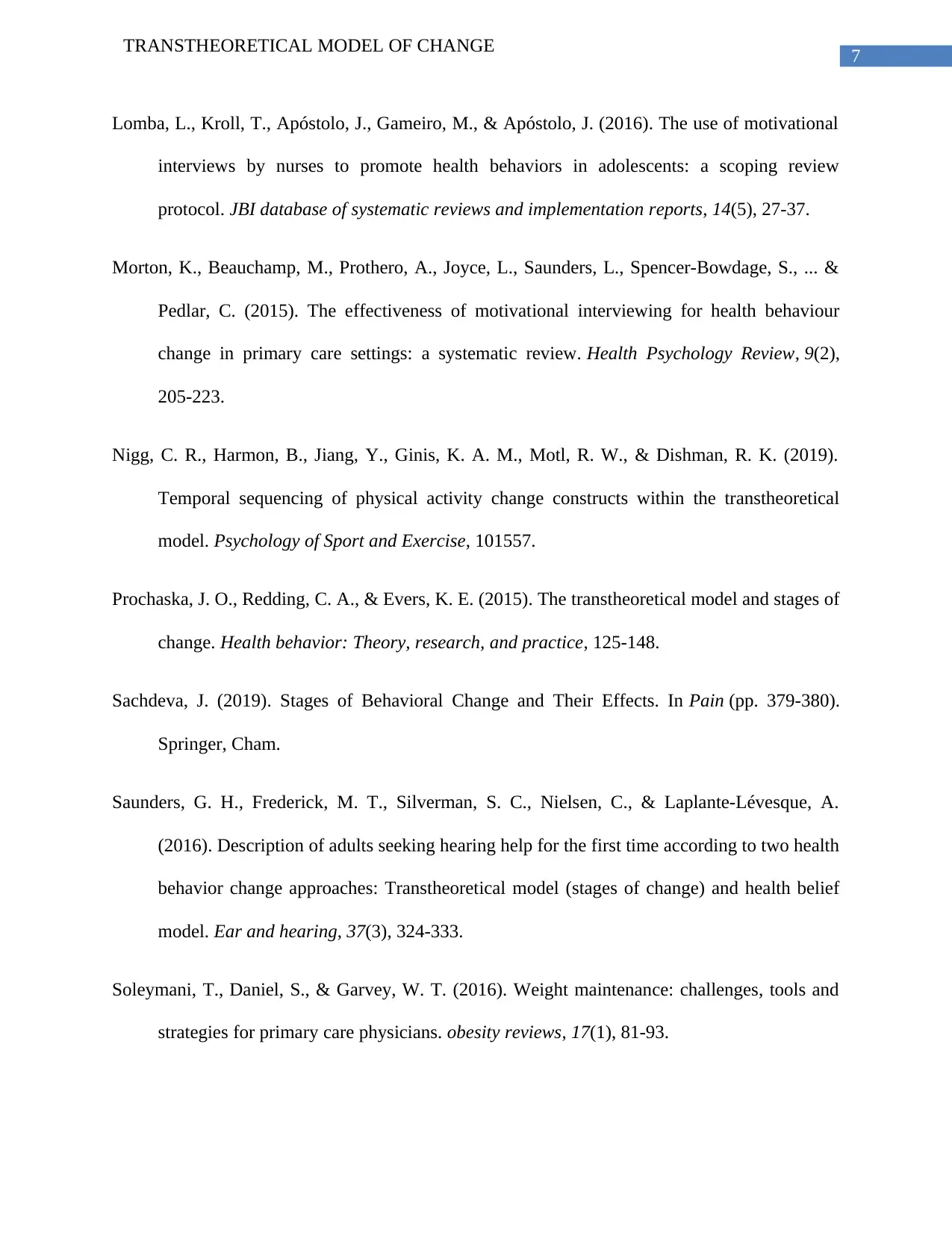
7
TRANSTHEORETICAL MODEL OF CHANGE
Lomba, L., Kroll, T., Apóstolo, J., Gameiro, M., & Apóstolo, J. (2016). The use of motivational
interviews by nurses to promote health behaviors in adolescents: a scoping review
protocol. JBI database of systematic reviews and implementation reports, 14(5), 27-37.
Morton, K., Beauchamp, M., Prothero, A., Joyce, L., Saunders, L., Spencer-Bowdage, S., ... &
Pedlar, C. (2015). The effectiveness of motivational interviewing for health behaviour
change in primary care settings: a systematic review. Health Psychology Review, 9(2),
205-223.
Nigg, C. R., Harmon, B., Jiang, Y., Ginis, K. A. M., Motl, R. W., & Dishman, R. K. (2019).
Temporal sequencing of physical activity change constructs within the transtheoretical
model. Psychology of Sport and Exercise, 101557.
Prochaska, J. O., Redding, C. A., & Evers, K. E. (2015). The transtheoretical model and stages of
change. Health behavior: Theory, research, and practice, 125-148.
Sachdeva, J. (2019). Stages of Behavioral Change and Their Effects. In Pain (pp. 379-380).
Springer, Cham.
Saunders, G. H., Frederick, M. T., Silverman, S. C., Nielsen, C., & Laplante-Lévesque, A.
(2016). Description of adults seeking hearing help for the first time according to two health
behavior change approaches: Transtheoretical model (stages of change) and health belief
model. Ear and hearing, 37(3), 324-333.
Soleymani, T., Daniel, S., & Garvey, W. T. (2016). Weight maintenance: challenges, tools and
strategies for primary care physicians. obesity reviews, 17(1), 81-93.
TRANSTHEORETICAL MODEL OF CHANGE
Lomba, L., Kroll, T., Apóstolo, J., Gameiro, M., & Apóstolo, J. (2016). The use of motivational
interviews by nurses to promote health behaviors in adolescents: a scoping review
protocol. JBI database of systematic reviews and implementation reports, 14(5), 27-37.
Morton, K., Beauchamp, M., Prothero, A., Joyce, L., Saunders, L., Spencer-Bowdage, S., ... &
Pedlar, C. (2015). The effectiveness of motivational interviewing for health behaviour
change in primary care settings: a systematic review. Health Psychology Review, 9(2),
205-223.
Nigg, C. R., Harmon, B., Jiang, Y., Ginis, K. A. M., Motl, R. W., & Dishman, R. K. (2019).
Temporal sequencing of physical activity change constructs within the transtheoretical
model. Psychology of Sport and Exercise, 101557.
Prochaska, J. O., Redding, C. A., & Evers, K. E. (2015). The transtheoretical model and stages of
change. Health behavior: Theory, research, and practice, 125-148.
Sachdeva, J. (2019). Stages of Behavioral Change and Their Effects. In Pain (pp. 379-380).
Springer, Cham.
Saunders, G. H., Frederick, M. T., Silverman, S. C., Nielsen, C., & Laplante-Lévesque, A.
(2016). Description of adults seeking hearing help for the first time according to two health
behavior change approaches: Transtheoretical model (stages of change) and health belief
model. Ear and hearing, 37(3), 324-333.
Soleymani, T., Daniel, S., & Garvey, W. T. (2016). Weight maintenance: challenges, tools and
strategies for primary care physicians. obesity reviews, 17(1), 81-93.
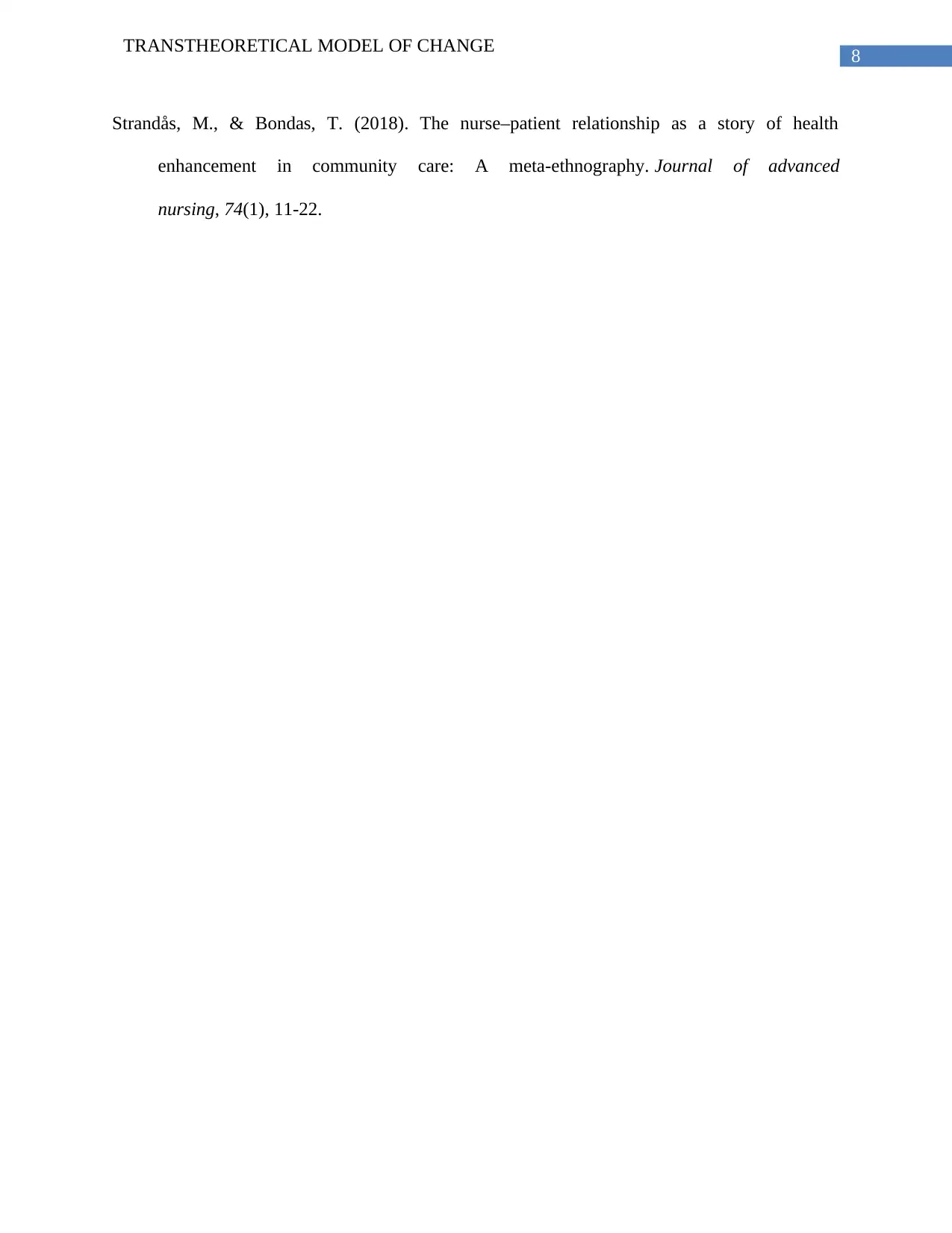
8
TRANSTHEORETICAL MODEL OF CHANGE
Strandås, M., & Bondas, T. (2018). The nurse–patient relationship as a story of health
enhancement in community care: A meta‐ethnography. Journal of advanced
nursing, 74(1), 11-22.
TRANSTHEORETICAL MODEL OF CHANGE
Strandås, M., & Bondas, T. (2018). The nurse–patient relationship as a story of health
enhancement in community care: A meta‐ethnography. Journal of advanced
nursing, 74(1), 11-22.
⊘ This is a preview!⊘
Do you want full access?
Subscribe today to unlock all pages.

Trusted by 1+ million students worldwide
1 out of 9
Related Documents
Your All-in-One AI-Powered Toolkit for Academic Success.
+13062052269
info@desklib.com
Available 24*7 on WhatsApp / Email
![[object Object]](/_next/static/media/star-bottom.7253800d.svg)
Unlock your academic potential
Copyright © 2020–2026 A2Z Services. All Rights Reserved. Developed and managed by ZUCOL.





